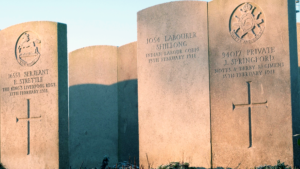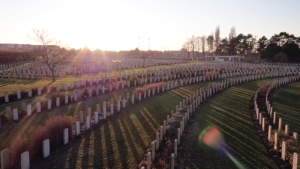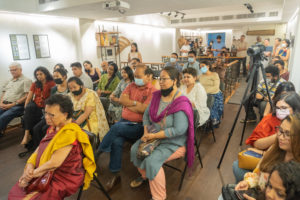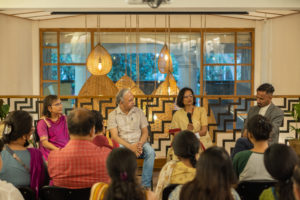By Patricia Mukhim
 Recently, the film, ‘Because We Did Not Choose’ directed by Wanphrang Diengdoh was screened at The Meghalayan Age Store in Connaught Place, New Delhi. It attracted quite an eclectic audience that engaged in a vibrant discussion post the screening. The panel discussion was moderated by yet another sensitive film maker, Utpal Borpujari and the panelists included Wanphrang Diengdoh himself, noted author and JNU Prof (retd) Radhika Singha and Patricia Mukhim, Editor, The Shillong Times.
Recently, the film, ‘Because We Did Not Choose’ directed by Wanphrang Diengdoh was screened at The Meghalayan Age Store in Connaught Place, New Delhi. It attracted quite an eclectic audience that engaged in a vibrant discussion post the screening. The panel discussion was moderated by yet another sensitive film maker, Utpal Borpujari and the panelists included Wanphrang Diengdoh himself, noted author and JNU Prof (retd) Radhika Singha and Patricia Mukhim, Editor, The Shillong Times.
There are films and there are films. Wanphrang Diengdoh does not just make films. He revisits the forgotten past, does exhaustive research, digs into the British and Welsh Libraries and stitches together facts that do not glorify the past but tells the story as it happened. Wanphrang started making the film “Because We Did Not Choose” in 2014 and completed it after three years. Making a documentary is a lot of grunt work and requires a different level of perseverance but Wanphrang was determined to tell the untold story of ‘Mot Phran’ a memorial to those that were drafted as a Labour Corp and were taken to France in 1915 to assist the British soldiers fighting Germany in the First World War.
 Research led Wanphrang to the nooks and corners of Meghalaya and also to the land of the erstwhile conquerors to piece together the facts and also to interview some of those who are still alive today and know the manner in which missionaries were told to convince the natives to join the Labour Corp.
Research led Wanphrang to the nooks and corners of Meghalaya and also to the land of the erstwhile conquerors to piece together the facts and also to interview some of those who are still alive today and know the manner in which missionaries were told to convince the natives to join the Labour Corp.
The British entered the Khasi Hills after they won the Anglo-Burmese War and signed the Treaty of Yandaboo in 1826. Along with their conquest they also started their civilising mission; sending the Welsh Missionaries to literally tame the hill tribes who they kept out of the rest of the mainland via the Eastern Bengal Frontier Regulation Act 1873. In 1915 a call was given to the Khasi, Jaintia, Garo, Naga and Lushai by the Welsh Presbyterian Missionaries to join the Labour Corp making it sound almost like a divine mission. Nearly about 2000 people joined the Labour Corp and were taken first to Madras then to Bombay and then by ship to Mesopotamia and thence to France. Quite a few died of Dysentery on the way to Bombay. Others died on the long journey by ship. All in all it’s a sad story of natives being drafted to serve the interests of the conquerors.
These men went because they were promised that they and their families would not have to pay revenue to the Crown and that life would be better than tilling the soil. Some in fact went because they wanted to escape the harsh life as farmers. The British remember them as being always cheerful but it is assumed that the men were actually mocking their fates for having come to a sort of ‘no man’s land’ leaving their familiar surroundings. The letters they wrote to their families back home were censored and anything adverse written by the members of the Corp was blacked out and sometimes not sent at all.
 Amongst those drafted was a Reverend Mannar from Jaintia Hills who was one of the few who returned from France unhurt. He told his children to bury him in the forest and not bother to make a separate graveyard or pay their respects to him.
Amongst those drafted was a Reverend Mannar from Jaintia Hills who was one of the few who returned from France unhurt. He told his children to bury him in the forest and not bother to make a separate graveyard or pay their respects to him.
The film takes the audience through the journey of these simple folk that had never left their hearths and homes to go to a foreign land in November 1915. By the time the Labour Corp reached France it was December and brutally cold. Many could not survive the extreme cold and died. Rev Davies the Missionary who had been in India and who was responsible for drafting the Labour Corp wrote to his friends and fellow workers to donate vests, socks and other warm clothing for the labourers.
Making of the film is a story in itself and we leave Wanphrang to tell the readers the rough and tumble of his journey in film making.
- What triggered the thought in you to make this film? Is this the only film after 1987?
19/87 was my first jab at a film after I finished my Masters from Jamia Millia Islamia and shortly after, I was awarded an Early Career Filmmaking Fellowship from TISS, Mumbai for “Where the Clouds End”, a film on the idea of borders and racial purity. I noticed that there was a considerable amount of literature that came about during the late 1800’s and early 1900’s in Khasi. This also coincided with the beginning of the first printing press in the Khasi and Jaintia hills. Some of those publications ran a lot of news and articles on the First World War. And then of course when I discovered that there were more than 2000 people who left for the war from the present state of Meghalaya, I knew there was a film that had to be made.
There was also a short account by the poet and writer Primrose Gatphoh called ‘Na India sha Persia’ that he wrote about his travels during the First World War. It is perhaps the first account by a Khasi writing about other people- an attempt at anthropology without even trying to be that. The of course, the accidental discovery of the Rev. Shai Rabooh’s letters thanks to his daughters. Those letters need to be studied not just by students of literature but also policy makers to better understand the implications of war, religion and politics in the State.
- When is Flaneur premiering in the Shillong cinema halls. Isn’t it important for people to also see films that set them thinking instead of just good old entertainment?
We are negotiating an online release for “Lorni- the Flaneur” and if there are no more surprises, the film should be out on the OTT platforms soon. We also have a theatrical release which means that it will also play in the theatres in Shillong and elsewhere after its release online.
It is important to get people to think but one cannot force them to do what they do not want to do. The concept of art and culture as a means to inform and educate is something that is  almost non-existent in our state. We have been taught that we have or had was barbaric and not worthy of culture. The speaking of Khasi language is not encouraged in schools and is only made a subject in 2nd standard that too as a second language and anything that is considered “Khasi” is considered inferior. I mention this because in most instances an art form- be it moving images, painting, photography or writing is always informed by the mother tongue. Our language carries our entire philosophy, cosmology and even our history. Unless we shed off a bit of our colonial-hangovers, we are destined to only duplicate and replicate and not arrive at anything artistically significant. But that’s just my opinion. Also, if I was given even one-tenth of the budget meant for law and order in Meghalaya and divert it towards community based arts practice and programs, I am certain the number of racial conflicts would reduce drastically. Young people need spaces to create, debate and argue. This is the framework of democracy. But I suppose it is in the interest of powers that be to maintain conflict so that young people are diverted from the real issues that plague our state. There is a lot of answering to do if all the younger generation from all the different communities in Meghalaya come together and start questioning the powers that be.
almost non-existent in our state. We have been taught that we have or had was barbaric and not worthy of culture. The speaking of Khasi language is not encouraged in schools and is only made a subject in 2nd standard that too as a second language and anything that is considered “Khasi” is considered inferior. I mention this because in most instances an art form- be it moving images, painting, photography or writing is always informed by the mother tongue. Our language carries our entire philosophy, cosmology and even our history. Unless we shed off a bit of our colonial-hangovers, we are destined to only duplicate and replicate and not arrive at anything artistically significant. But that’s just my opinion. Also, if I was given even one-tenth of the budget meant for law and order in Meghalaya and divert it towards community based arts practice and programs, I am certain the number of racial conflicts would reduce drastically. Young people need spaces to create, debate and argue. This is the framework of democracy. But I suppose it is in the interest of powers that be to maintain conflict so that young people are diverted from the real issues that plague our state. There is a lot of answering to do if all the younger generation from all the different communities in Meghalaya come together and start questioning the powers that be.
- Does film making take a hell of a lot out of you? You seem to struggle deep inside while trying to explain certain facets of Because We Did Not Choose (Ban Sah Kynmaw) to the curious audience. Why so?
Yes, filmmaking does take a toll but I enjoy it because it challenges me and reaffirms my faith and my trust in the arts to inform and create opinions so that the place we live in is one that can accommodate a pluralistic tradition.
I think we can all agree that it is difficult to summarize Shillong or the Northeast for that matter into bite sized conversations and discussions. There are no binaries and every matter requires a firm understanding of the realities of the place in question. One also has to be particular as far as what one says in an era of polarized identities. Then of course, there are the odd questions that I cannot seem to understand or comprehend yet I am aware that I still need to be polite and respond to them. Perhaps those are the ones that I struggle with the most.
(Ban Sah Kynmaw is the name of the event at The Store. Because We did Not Choose is the name of the film).
- Also how many Khasi, Jaintia, Garo Lushai are buried in that graveyard in France? Do people go there to pay their respects to the dead soldiers? Why was the British force stationed in France anyway?
There are about thousands of graves of the Khasi, Jaintia, Garo and Lushai’s in France and perhaps even elsewhere in the theatres of the First World War. No one can really confirm the exact number of casualties. The problem is also the haphazard manner in which they were recruited which meant that no one was quite aware of who their next of kin was. Sometimes, it was the village headman who was declared as the next of kin upon filling up the recruitment forms.
There are commemoration and remembrance services held every year for combatants and non-combatants all across the world. There is a Garo Labour Corps day as well but as Prof. Milton Sangma, aptly said in the film, these are only “goody goody things” that are mere tokenistic events.
Also, unlike the Second World War, the First World War is one that historical and cultural gatekeepers of the country and the State of Meghalaya have a tough time appropriating. This is perhaps what fascinated me about the Khasi and Jaintia Labour Corps- these stories and people that refuse to fit in any category of nationalism or patriotism, be it in Meghalaya or in our country but yet their stories live forever- if not at Motphran, where only a handful of names are mentioned but in muted conversations at funeral houses or family gatherings because thankfully every Khasi is a raconteur.
I also find it equally fascinating because firstly, the people who went to war do not fit the generic and simplistic narrative of the “Khlawait ka ri” because they were labourers. Secondly, the role of the Presbyterian Church and the British Government in recruiting them and the subsequent failure of both institutions to rehabilitate them. Thirdly, the ejection of the Salvatorian Missionaries from Shillong because they were accused of being spies. Fourthly, the constant publications with regards to what was happening in France and Mesopotamia in the “Nongialam Khristan” by the Ri Khasi Press given their religious inclinations and finally the blacklisting of “Nongphira” published by Sib Charan Roy for publishing anti-war articles.
- At what age do you think Pastor Shai Rabooh Mannar left for that journey? What was the average age of the labour corp?
I would have to speculate with regards to his age. Perhaps around 20plus. Similarly, the average age of the Khasi Labour Corps would have been 15-18 or even more. As mentioned above, the recruitment was also carried out haphazardly. There were no birth certificates to determine their actual date of birth because quite a lot of them were recruited from remote villages.
Before the screening of the film, Ms Alvareen Dkhar whose father (late) Primrose Gatphoh a noted Khasi author was also drafted by the British as a clerk and taken to Mesopotamia, gave a short talk on how her grandfather, the noted poet U Soso Tham and father of Primrose Gatphoh would write letters to his son exhorting him to spend his time there wisely in reading and writing. As of today, those letters have been compiled in a book by Alvareen Dkhar. We hope that the film and its essence touches the souls of our people just as did it during its screening



